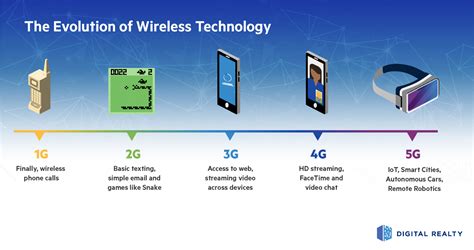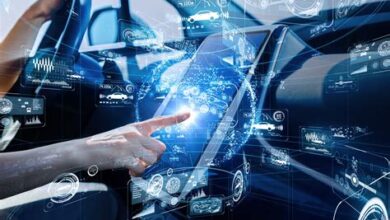The Promise of 5G Technology

Discover the impact of 5G on mobile devices, its role in smart cities, and revolutionizing healthcare, and the security challenges and solutions for 5G.5G technology has been the talk of the town in recent years, promising faster internet speeds, improved connectivity, and revolutionizing various industries. In this blog post, we will delve into the world of 5G technology and explore its impact on mobile devices, smart cities, healthcare, and the challenges it poses for security. As we unravel the promise of 5G, we will discuss its potential to transform the way we live, work, and communicate. From understanding the basics of 5G technology to its role in building smart cities and revolutionizing healthcare, we will cover it all. Additionally, we will also address the security challenges that come with the adoption of 5G and explore potential solutions to mitigate these risks. So, get ready to embark on a journey into the world of 5G technology and discover the endless possibilities it holds for the future.
Understanding 5G Technology
5G technology is the next generation of mobile networks, set to revolutionize the way we communicate and connect with the world. It promises ultra-fast network speeds, high capacity, and low latency, making it ideal for a wide range of applications, from streaming high-definition video to enabling internet of things devices.
Unlike its predecessors, 4G and 3G, 5G operates on higher frequencies and uses advanced antenna technology, enabling it to transmit data at incredibly fast speeds. This means that you’ll be able to download a movie in seconds, and enjoy seamless video calls without any lag or buffering.
In addition to faster download and upload speeds, 5G technology will enable innovative applications such as autonomous vehicles, smart cities, and telemedicine. It’s not just an upgrade to our mobile network, but a catalyst for the digital transformation of entire industries.
Impact of 5G on Mobile Devices
The impact of 5G on mobile devices is significant, as this new technology promises faster speeds, lower latency, and greater connectivity. With 5G, mobile devices will be able to download and upload data at unprecedented speeds, making activities such as streaming video, online gaming, and video conferencing seamless and lag-free. This enhanced connectivity will also enable new innovations in mobile technology, such as augmented reality (AR) and virtual reality (VR) applications, which require high-speed, low-latency connections.
Furthermore, 5G’s impact on mobile devices extends beyond just faster speeds. The increased connectivity and lower latency provided by 5G will pave the way for the Internet of Things (IoT) to become more integrated into everyday mobile experiences. This means that devices such as smartwatches, fitness trackers, and even household appliances will be able to communicate and interact seamlessly with mobile devices, creating a more interconnected and efficient digital ecosystem.
Overall, the impact of 5G on mobile devices will revolutionize the way we use and interact with our smartphones and other mobile devices. Faster speeds, lower latency, and greater connectivity will not only enhance current mobile experiences but also enable new and innovative technologies to thrive in the mobile space.
5G’s Role in Smart Cities
5G technology is set to revolutionize the way cities operate, bringing about an era of smart cities where everything from traffic lights to public transportation is connected and communicating in real-time. The promise of 5G in smart cities lies in its ability to connect millions of devices simultaneously, allowing for seamless communication between city infrastructure and the people who live in it. This technology will enable cities to become more efficient, sustainable, and responsive to the needs of their residents.
With the advent of 5G, smart cities will be able to implement advanced technologies such as autonomous vehicles, smart energy grids, and remote healthcare services. This will not only improve the quality of life for city dwellers, but also reduce the environmental impact of urban areas. 5G’s high data speeds and low latency will make it possible to deploy innovative solutions for traffic management, waste disposal, and emergency services, creating safer and more efficient urban environments.
Furthermore, the role of 5G in smart cities extends beyond infrastructure and public services. It will also spur economic growth by attracting investment in new industries and technologies. The implementation of 5G networks will create job opportunities in areas such as digital infrastructure, cybersecurity, and data analytics, positioning smart cities as hubs for innovation and technological advancement.
Revolutionizing Healthcare with 5G
Revolutionizing Healthcare with 5G
The introduction of 5G technology has sparked a revolution in the healthcare industry, offering unprecedented opportunities to improve patient care, enhance medical research, and streamline healthcare operations. With its ultra-fast speed, high reliability, and low latency, 5G has the potential to transform the way healthcare is delivered and accessed, paving the way for a new era of medical innovation.
One of the most significant ways 5G is revolutionizing healthcare is through its support for remote patient monitoring and telemedicine. With the high-speed connectivity and low latency of 5G networks, healthcare providers can remotely monitor patients in real time, collect and transmit vital signs and medical data, and conduct virtual consultations with patients, regardless of their location. This capability not only improves access to healthcare for patients in remote or underserved areas but also reduces the burden on traditional healthcare facilities, freeing up resources for more critical cases.
Furthermore, 5G technology is enabling the advancement of precision medicine and personalized healthcare. The ability to process large volumes of data quickly and efficiently over 5G networks allows for more accurate and timely diagnosis, treatment, and monitoring of individual patients. From remote surgeries performed by robotic systems to wearable health devices that continuously track and analyze patient data, the possibilities for improving patient outcomes and healthcare delivery are vast with the power of 5G.
Security Challenges and Solutions for 5G
With the rapid evolution of technology, the rollout of 5G networks brings with it a new set of challenges and concerns in terms of security. The increased speed and connectivity of 5G technology also open up new opportunities for cyber attacks and unauthorized access to sensitive information. As more devices become connected to the 5G network, the potential for security breaches grows exponentially, making it crucial for organizations and individuals to understand and address these challenges.
One of the key security challenges of 5G lies in the sheer volume of connected devices and the massive amounts of data being transferred across the network. This creates a larger attack surface for cybercriminals to exploit, as well as potential vulnerabilities in the network infrastructure itself. Additionally, the use of virtualization and cloud-based technologies in 5G networks can introduce new points of entry for attackers, requiring a reevaluation of traditional security measures.
However, the promise of 5G technology also brings innovative solutions to these security challenges. Advanced encryption protocols and authentication mechanisms can be implemented to protect data and ensure the integrity of communications over the 5G network. Furthermore, machine learning and artificial intelligence tools can be leveraged to detect and respond to security threats in real time, providing a proactive defense against cyber attacks.





